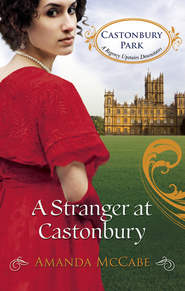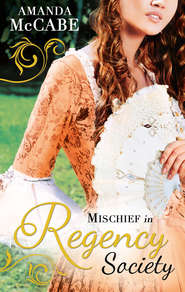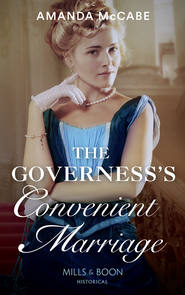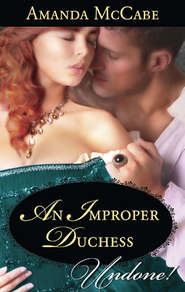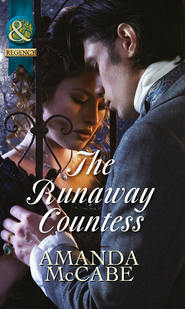По всем вопросам обращайтесь на: info@litportal.ru
(©) 2003-2025.
✖
To Deceive a Duke
Настройки чтения
Размер шрифта
Высота строк
Поля
Clio glanced back to the garden below, to their father and Lady Rushworth reading together so companionably. He smiled as Lady Rushworth pointed to something in their book, catching her hand to press a quick kiss to her gloved fingers. Lady Rushworth, a widow herself with two grown sons and grandchildren, blushed. Clio had not seen her father so happy since her mother had died.
‘Then again, perhaps the next Chase to wed won’t be a Muse at all,’ she said.
Thalia hurried to her side, gazing down at the scene. ‘You don’t mean—Father will marry Lady Rushworth?’
‘Perhaps.’
‘But they are just friends!’
‘Maybe. But if they do wed, Father won’t want so many Muses underfoot for a while. And, since you are the most beautiful of all of us, you will probably be next.’
Thalia frowned, turning away from the window. ‘Me? I look like a bonbon, whereas you look like a goddess. You are sure to attract someone interesting, someone strong and clever and…’ Her voice trailed away, and Clio saw her golden head bow.
Clio was suddenly worried. Thalia was seldom anything less than running at top speed, charging ahead with her glorious confidence. She reached out and caught Thalia’s hand, drawing her sister back to her side. ‘What’s wrong, Thalia dear? Has something happened?’
Thalia tilted her chin up, smiling, but her china-blue eyes still held a strange glitter. ‘Of course not, Clio. What could possibly have happened? I just don’t care for all this marriage talk, that’s all! Not when I am in danger of being stuck with one of my horrid suitors.’
‘Thalia, there is no danger of being “stuck”! If you really don’t want to marry…’
‘I will marry—when I meet someone who suits me as Cameron does Calliope.’ Thalia gave Clio’s hand a reassuring squeeze before letting go to stroll back to the desk. She reached for a fat letter, holding it up. ‘And I see you’ve heard from Calliope, the new Lady Westwood, today!’
‘Yes, I thought we could all read Calliope’s news together after dinner,’ Clio answered.
Thalia turned the missive over in her hand. ‘Where are they now, do you think? Capri? Tuscany? Venice?’
‘On their way back to England, I expect. Hopefully, they’ll be waiting for us when we return ourselves.’
‘With a new little Chase-de Vere infant on the way.’ Thalia put down the letter. ‘Do you miss her terribly?’
‘Calliope?’ Clio remembered sitting by a Yorkshire stream with Cal. “You can tell me anything from nowon, Clio.” Clio had promised she would keep no more secrets, that she was done with the Lily Thief. And she had truly tried to keep that promise. Tried to live up to her older sister’s confidence. It had gone well, until that very morning, when Averton had appeared. ‘Of course. None of us have ever been parted for long before. Don’t you miss her?’
‘Very much. I just thought it must be worse for you. You and Cal were always so close.’
‘Yes. But I still have you! And I always will, if we’re going to be spinster Muses together.’
Thalia laughed, and the merry sound seemed to help her shrug off whatever hint of melancholy she was suffering. She twirled around and caught Clio’s hand in hers. ‘Cal’s children will be sorry to have such formidable old aunts! I will teach them music and drama, and how to shoot a bow and arrow. You will teach them how to swim for miles, just like you, and how to read history from just a shard of pottery.’
Clio laughed, too, going along with her. ‘How to sew very, very badly?’
‘That, too. But as the child is not here yet we shall have to—oh!’
‘What?’
‘I forgot why I came in here in the first place. I am going to call on Lady Riverton, and you promised to come with me.’
Clio felt a sinking in the pit of her stomach at the mention of Lady Riverton. The widow was the self-styled ‘social leader’ of the small band of English travellers in Santa Lucia. People who, like the Chases, were deeply interested in history and antiquities. Everyone else was sensible, and stayed near the cool delights of the shore, the relative culture of Palermo.
Viscount Riverton had possessed a considerable collection himself, especially of Greek coins. His widow, while she claimed to be carrying on his work, seemed to be only really interested in parties, gossip and hats. She had lots and lots of hats. Clio often thought it was a pity she didn’t also have a many-headed Cerberus to guard her door; then it could wear all of them at once.
But Clio had promised Thalia. ‘I’ll have to change my clothes,’ Clio said, gesturing to her garb. She had left off her heavy boots, but still wore her old brown muslin with its dusty hem. Her hair fell down her back in an untidy auburn plait.
‘Just plop on a fancy bonnet!’ Thalia said. ‘She’ll never notice the rest.’ She ‘plopped’ her own hat on to Clio’s head, tugging at the pink ribbons and singing, ‘Oh la la, aren’t the Chase sisters so terribly à la mode!’
Clio laughed helplessly, trying to spin away from her sister. Thalia wouldn’t let go. ‘Brown and pink, Clio, all the rage from Paris! You must be—oh, I say. Where are your spectacles?’
Chapter Six
Lady Riverton’s palazzo was the grandest in town, if not as dramatically situated as the Baroness Picini’s rambling manse. Lady Riverton’s abode had been refurbished before she took possession, freshly stuccoed and painted so that it gleamed a bright, artificial white in the sun. There were no gaps in the tiles of the roof, no overgrown ivy, no slats missing from the shutters, no chips in her garden fountain, which splashed and gurgled as Clio and Thalia turned in through her polished black gates.
‘We won’t stay long,’ Clio said, waiting for their knock to be answered.
‘Of course not,’ Thalia answered, smoothing her pink kid gloves. ‘I don’t think we could take more than an hour without screaming, do you?’
The butler opened the doors, and Clio thought, as she always did when coming to visit Lady Riverton, that it was like stepping back into England. Unlike the Chases’ own rented house, furnished with comfortable, slightly shabby pieces, Lady Riverton had filled her space with dark, gleaming tables and cabinets. Chairs, couches and hassocks upholstered in blue-striped satin, interspersed with displays of her collections: vases, coffers, fragments of statues, cases showing off her husband’s ancient coins.
Lady Riverton herself sat on a throne-like chair and presided over an elaborate tea table, set with silver, porcelain, platters of tiny sandwiches and pink-iced cakes. Her light brown hair, untouched by any hint of grey, was crowned with a dainty lace cap matching the filmy fichu tucked into her pale green muslin gown. A pair of antique cameos dangled from her ears.
Once, in a different life, those earrings had been just the sort of thing to tempt Clio to ‘liberate’ them. But she had made promises, so all she said as she greeted Lady Riverton was, ‘Such charming earrings.’
Lady Riverton trilled a light laugh, reaching up to toy with one of the fragile cameos. ‘A gift from my dear late husband. He had such excellent taste! I am honoured you have decided to grace my tea table this afternoon, Miss Chase, Miss Thalia. We see so little of you lately, you always seem to be trailing around the fields with your father.’
Clio nodded at the other guests, Lady Elliott—whose husband helped her father at the villa site—and her daughters, Mrs Darby and her daughter—who had taken Clio on their impromptu Agrigento tour—as she and Thalia took their seats. Lady Riverton’s friend, her ‘cicisbeo’ as Thalia called him, Ronald Frobisher, was not present, which was most unusual. ‘There is certainly a great deal to see in Sicily,’ Clio said, accepting a cup of tea. ‘Much work to be done.’
Lady Riverton laughed again. ‘Oh, certainly I know all about that! Viscount Riverton was one of the first to see the vast potential of this site. It was just a dusty valley when he came here with Nelson! I’m most gratified to see his work being carried on so admirably. But I also know that young ladies must have their share of amusement. Before I married, I had far too much energy and natural merriment to live by digging alone!’
‘That is so true!’ cried Miss Darby. ‘I am always telling Mama—’
Mrs Darby laid a gentle hand on her daughter’s arm, stilling the excited flow of words. ‘And we are very gratified you provide such—amusements, Lady Riverton.’
‘Not at all. I so vastly enjoy entertaining, and my dear husband always said my parties were so very elegant.’ She gave another little laugh. ‘He was so indulgent. But I do hope you will all be at my next gathering! An evening of amateur theatricals, very diverting. You all received your invitations?’
Clio calmly sipped at her tea, silently willing Thalia not to have an excited outburst à la Miss Darby. Lady Riverton hardly needed any fodder for her ‘Gracious Hostess’ act. ‘Indeed we did, Lady Riverton. We will be most happy to attend.’
‘So kind of you to ask us,’ Thalia said coolly. Clio was proud of her. ‘That is one thing I miss so much about London, the theatre.’
‘As do I, Miss Thalia,’ Lady Riverton answered. ‘We are both cultured souls, I see! While I cannot procure the likes of Mrs Siddons, I fear, I do hope to show off some of our local talent, which I suspect is quite great. The Manning-Smythes have agreed to stage a scene from Romeo and Juliet. So appropriate, is it not, since they are on their honeymoon? And Miss Darby here will do Ophelia’s mad scene. It is so important to include Shakespeare! His more appropriate bits, at least.’
‘Oh, yes,’ Clio said. ‘The Bard is always welcome. But, as this is Sicily, would it not be a fine thing to include some classical playwrights? For is this not where Ovid and Aeschylus worked?’
‘But the Greeks and Romans are so very violent, aren’t they?’ Lady Riverton murmured, her lace cap quivering. ‘So much blood and vengeance!’
Unlike Shakespeare, of course, Clio thought wryly. No blood or vengeance there.
‘But always so vastly exciting,’ Lady Elliott said over her sandwiches. ‘You have been working yourself on some Sophocles, have you not, Miss Thalia?’
‘Indeed,’ Thalia answered. ‘Antigone. The amphitheatre here is so wondrous, with superb acoustics, it just seemed to call out to be brought to life again! To be used for its true purpose. Yet I fear Antigone features no blood at all.’
‘Yes. All the death is offstage, is it not?’ Mrs Darby said. ‘Still, very dramatic.’







